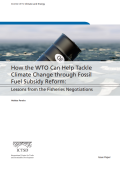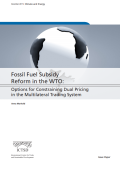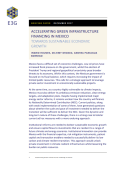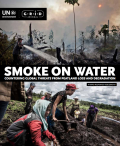

The paper Fossil Fuel Subsidy Reform in the WTO: Options for Constraining Dual Pricing in the Multilateral Trading System discusses the practice of energy dual pricing in the broader context of fossil fuel subsidy reform. The contribution explores avenues for constraining dual pricing, which is approached as a fossil fuel subsidy, within the framework of the WTO. It does so by proposing options under existing rules, as well as suggesting changes to the system beyond current rules.
The piece suggests that WTO members wishing to take action against dual-pricing policies maintained by other members could explore bringing a case to dispute settlement on the basis of specific provisions under the General Agreement on Tariffs and Trade (GATT), the Agreement on Subsidies and Countervailing Measures (ASCM) and/or the Anti-Dumping Agreement (ADA). Bringing a case would send a strong signal that dual-pricing policies are not immune to being challenged in a WTO dispute. Moreover, it is likely that this would function as a trigger to rapidly include talks on broader fossil fuel subsidy reform on the WTO agenda.


Smoke on Water – Countering Global Threats From Peatland Loss and Degradation is a Rapid Response Assessment that looks at peatland location, extent, threats and the policies to manage and protect them. The goal of this rapid response assessment, carried out on behalf of UN Environment and based on the efforts of more than 30 contributors, is to raise awareness about the importance of the world's peatlands and to encourage immediate action to preserve them.
The assessment supports the Global Peatlands Initiative and is based on existing data and information. Its main messages are:
1. Peatlands are important to human societies around the world. They contribute signicantly to climate change mitigation and adaptation through carbon sequestration and storage, biodiversity conservation, water regime and quality regulation, and the provision of other ecosystem services that support livelihoods.
2. Immediate action is required to prevent further peatland degradation and the serious environmental, economic and social repercussions it entails.
The Tracking Clean Energy Progress 2017 (TCEP) report highlights the overall status and recent progress in developing and deploying key clean-energy technologies.
Each year, TCEP assesses the latest progress in technology and market developments, tracks overall progress, and recommends further actions. TCEP this year shows that only 3 of 26 identified clean energy technologies are on track to meet a sustainable energy transition (one more than last year). 15 technologies showed only some progress, and 8 are significantly off-track and in need of renewed action.
